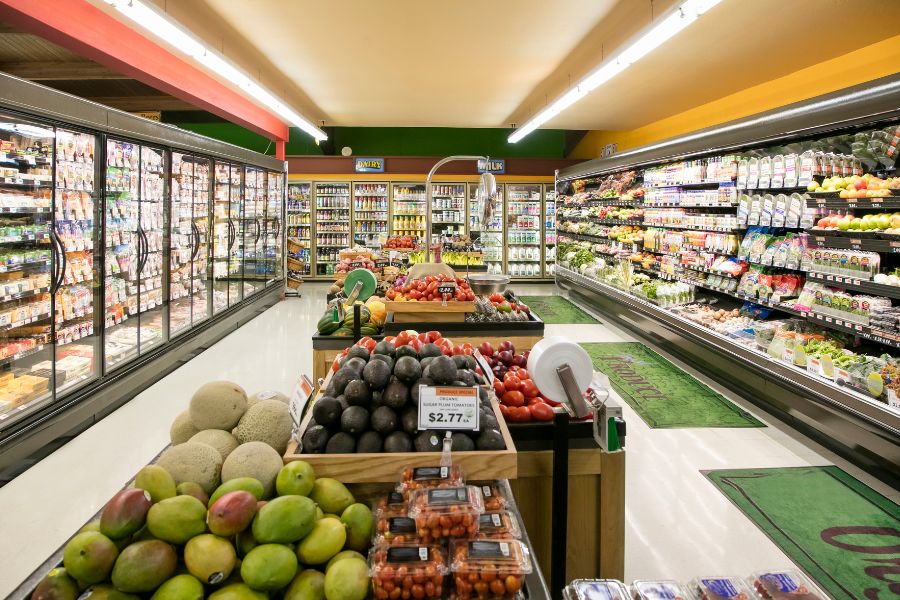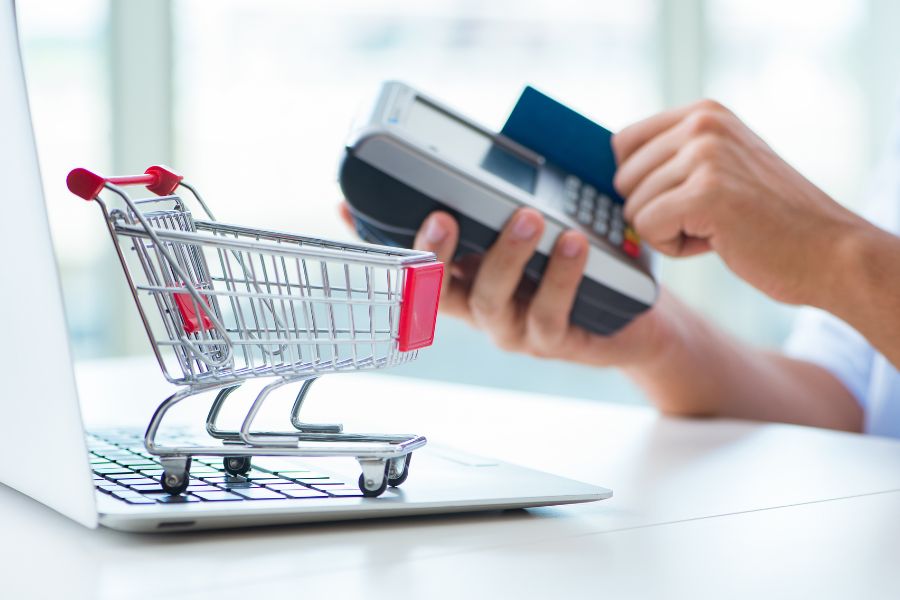Running a grocery store is no small feat, whether you’re managing a neighborhood shop or a large-scale enterprise. The efficiency of your operations hinges on how well you can handle inventory, manage sales, and satisfy customers while keeping costs down. The question many small and mid-sized grocers face is: “Are POS systems only for large enterprises?” The truth is that POS systems for grocery stores can be the game-changer you need, regardless of your store’s size. With the right POS system, even the smallest grocery store can streamline operations, reduce errors, and enhance customer experiences.
In this article, we’ll dive into why a POS system isn’t just for the big players but a critical tool for grocery stores of all sizes.
Highlights
- Enterprises use grocery POS systems to streamline multi-store management, optimize inventory, and gain valuable analytics.
- Small and medium grocery stores benefit from POS systems through better inventory management, quicker checkouts, and loyalty programs.
- To decide on a POS system, assess your store’s challenges, required features, scalability, budget, and support needs.
The Role of POS Systems for Grocery Stores
At its core, a POS system combines software and hardware to streamline sales transactions in grocery stores. Aside from handling payments, it’s essential for effective inventory management and generating valuable sales insights.
- Processing Customer Payments: With a POS system, you can handle transactions swiftly and accurately, accepting payments through cash, credit cards, and digital wallets. This reduces checkout times, making the experience smoother for your customers.
- Inventory Management: Managing the wide variety of products in your grocery store, especially those that are perishable, can be daunting. A POS system helps by tracking your stock levels in real time, alerting you when it’s time to reorder, and even automating the ordering process. This guarantees you’ll avoid the financial risks of running out of stock or overstocking.
- Sales Reporting: Your POS system generates detailed sales reports that give you insights into product performance, peak shopping hours, and customer preferences. These reports are essential for making informed decisions, such as adjusting prices or optimizing your store’s layout to boost sales.
For the advantages they bring, you can forget the idea that POS systems for grocery stores are solely for large enterprises. These brilliant solutions are incredibly beneficial to grocery stores of all sizes.
For small and medium-sized businesses, a POS system can transform operations by automating tasks like inventory management and sales tracking, freeing up time to focus on business growth.
Even if you run a smaller grocery store, a POS system can enhance your customer experience by reducing wait times at checkout and enabling loyalty programs that keep customers coming back. Modern POS systems are scalable, meaning they can grow with you. It doesn’t matter if you’re managing a single store or planning to expand; a POS system will adapt to your needs, making it a wise investment for your grocery store.
Advantages of POS Systems for Small and Medium-Sized Grocery Stores
Small and medium-sized grocery stores operate in a highly competitive market. To stay ahead, they need to leverage technology to streamline their operations and improve customer experience.
There are certain advantages of implementing POS systems for grocery stores:
- Cost Savings: The initial investment in a POS system might seem substantial, but it pays off over time. Automated inventory management reduces waste, while precise sales tracking helps you identify profitable products and fine-tune pricing strategies. This leads to significant cost savings in the long run.
- Enhanced Customer Experience: A POS system speeds up the checkout process, cutting down on wait times and boosting customer satisfaction. Features like digital receipts, loyalty programs, and personalized promotions improve the shopping experience and foster customer loyalty, encouraging repeat visits.
- Better Inventory Control: For small and medium-sized grocery stores, managing inventory can be a daunting task. A POS system simplifies this by providing real-time inventory updates, automatic reordering, and detailed stock reports. This ensures that your store is always stocked with the right products, minimizing the risks of stockouts or overstocking.
- Streamlined Operations: Beyond just managing inventory and sales, a POS system integrates various aspects of your business, from employee management to sales data analysis. This holistic approach streamlines your daily operations, giving you more time to focus on growth and customer service.
Advanced POS Features for Large Enterprises
For large enterprises, grocery store POS systems are strategic assets that allow businesses to scale efficiently, maintain consistency across multiple locations, and capitalize on data-driven insights to stay competitive.
Of course, to capture such plus points, POS systems for large grocery stores also need more complex and significant features.
Let’s look through some of them:
- Multi-Store Management: Managing multiple locations can be complex, but a POS system that supports multi-store management, like ConnectPOS simplifies this process. You can oversee inventory, sales, and promotions across all your stores from a single, centralized dashboard, helping to maintain operational consistency and streamline management tasks.
- Advanced Inventory Management: Handling a diverse range of products, particularly perishables, requires precision. Advanced inventory management tools, such as batch tracking, expiration date monitoring, and automated restocking, help you keep inventory levels optimized, reduce waste, and increase profitability.
- Customer Relationship Management (CRM): A CRM integrated with the POS system helps large grocery stores manage customer relationships more effectively. The store can offer personalized promotions, targeted marketing campaigns, and loyalty programs that enhance customer retention and increase sales by tracking customer purchases, preferences, and feedback.
- Robust Reporting and Analytics: Large grocery stores generate substantial data every day, and analyzing this data is key to making smart business decisions. A POS system with comprehensive reporting and analytics processes this information, offering insights into sales trends and customer behavior. These insights help drive growth and refine your strategies.
- Employee Management: Managing a large workforce is even easier with POS systems that include employee management features. Tools like time tracking, shift scheduling, and performance monitoring help you manage labor costs, meet labor regulations, and improve overall productivity.
Deciding if a POS System is Required for Your Grocery Stores
Choosing to invest in a POS system is a decision that shouldn’t be taken lightly. In other words, various factors should be evaluated to determine if a POS system suits your grocery store, regardless of size.
Factors to Consider
When determining if a POS system is necessary, think about your store’s size, current and anticipated sales volume, budget, and specific business needs. Reflect on how a POS system might streamline your operations, increase efficiency, and improve customer satisfaction.
For example, a small neighborhood grocery store with fewer transactions might not need a highly advanced POS system. In contrast, a larger store with high foot traffic and a diverse product range could benefit considerably from one.
Key Questions to Ask
Before investing in POS systems for grocery stores, ask yourself the following questions:
- What are my store’s specific needs? Consider the unique challenges your grocery store faces and how a POS system can address them.
- What features are essential? Determine the must-have features for your store, such as inventory management, sales reporting, and customer loyalty programs.
- Can the system grow with my business? Assess how the POS system can adapt as your business expands. It might be by adding new features or supporting multiple locations.
- What is my budget? Evaluate the total cost, including the initial purchase, ongoing maintenance, and any future upgrades.
- What level of support is available? Look for a POS provider with reliable customer support to assist with setup, training, and troubleshooting.
Comparing Manual Processes vs POS Systems
Many grocery stores, especially smaller ones, still rely on manual processes to manage their operations. But we all know that manual processes are often time-consuming, error-prone, and inefficient.
Here’s how a POS system compares:
- Accuracy: POS systems reduce human error by automating tasks like inventory tracking and sales reporting, resulting in more accurate data and fewer discrepancies.
- Efficiency: Automating routine tasks with a POS system lets your staff focus on more valuable activities, which increases overall efficiency and productivity.
- Scalability: While manual processes can become cumbersome as your store grows, a POS system can quickly adapt to your expanding business needs.
- Customer Experience: A POS system like ConnectPOS improves the customer experience with faster checkout, multiple payment options, and personalized promotions.
Evaluating the Return on Investment
Investing in POS systems for grocery stores is a significant financial decisionso you must evaluate the potential return on investment (ROI) before making any purchase for the service.
To calculate ROI, consider the following:
- Cost Savings: How much can be saved by reducing waste, optimizing inventory, and improving labor efficiency?
- Increased Revenue: How much additional revenue can be generated through better customer experiences, targeted marketing, and more effective inventory management?
- Long-Term Benefits: Think about the long-term advantages of having a scalable, efficient, and data-driven POS system that supports your store’s growth.
ConnectPOS can be tailored to meet the specific demands of grocery stores, providing essential tools for effective inventory management and sales tracking. Its ability to accurately manage stock levels and generate insightful reports supports smooth operations in single and multi-location setups. Thanks to its user-friendly interface and scalability, grocery store owners like you can better focus on elevating customer experiences and growing your businesses.
FAQs: POS Systems for Grocery Stores
- Are POS systems cost-effective for small grocery stores?
Yes, POS systems can be cost-effective for small grocery stores. While the initial investment might seem high, the long-term benefits, such as reduced waste, improved inventory management, and enhanced customer experience, often outweigh the costs. Additionally, many POS systems offer scalable solutions that can grow with your business, ensuring that you only pay for the features you need.
- How can a POS system improve customer experience in my grocery store?
A POS system can improve customer experience by speeding up the checkout process, reducing wait times, and offering multiple payment options. Additionally, features like digital receipts, personalized promotions, and loyalty programs can enhance customer satisfaction and encourage repeat business.
Conclusion
We hope you have the answer to “Are POS systems only for large enterprises?” POS systems for grocery stores shouldn’t be used only by large enterprises. They provide a wide range of benefits for grocery stores of all sizes, from small neighborhood shops to large supermarket chains. A POS system can be a worthwhile investment to streamline operations, enhance customer experience, or gain valuable insights into your business.
To learn more about how ConnectPOS can help your grocery store thrive, contact us today.
ConnectPOS is a all-in-one point of sale solution tailored to meet your eCommerce POS needs, streamline business operations, boost sales, and enhance customer experience in diverse industries. We offer custom POS with features, pricing, and plans to suit your unique business requirements.




